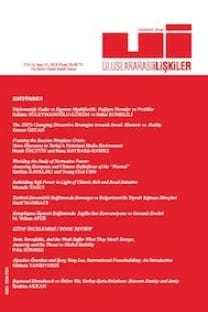İmparatorluğun Savaş Kararı: Osmanlı Devleti Birinci Dünya Savaşına Neden Girdi
In “İmparatorluğun Savaş Kararı”, the authors mainly discuss the reasons why an empire, which was on the verge of disintegration, became involved in a war between the Great Powers of Europe and whose conditions ultimately precipitated the end of that state. In attempting to answer these questions, they explain the decision to go to war in light of neoclassical realist theory rather than stereotypical ideas such as “the only option for the Ottoman Empire was to enter into war” or “Enver Pasha put the Ottoman Empire into war”, which are frequently repeated in the literature. As is understood, previous studies either focus on personal decisions (especially Enver Pasha and his team) and neglect systemic factors or focus on systemic factors (the change in balance of power that happened before World War I in Europe) and neglect the decision-making mechanisms of ruling groups and the way local politics worked. However, the authors of this book take a more complementary approach and attempt to merge the decision-making mechanisms of ruling groups and systemic factors.
Anahtar Kelimeler:
Osmanlı İmparatorluğu, Avrupa, Savaş Kararı
İmparatorluğun Savaş Kararı: Osmanlı Devleti Birinci Dünya Savaşına Neden Girdi
In “İmparatorluğun Savaş Kararı”, the authors mainly discuss the reasons why an empire, which was on the verge of disintegration, became involved in a war between the Great Powers of Europe and whose conditions ultimately precipitated the end of that state. In attempting to answer these questions, they explain the decision to go to war in light of neoclassical realist theory rather than stereotypical ideas such as “the only option for the Ottoman Empire was to enter into war” or “Enver Pasha put the Ottoman Empire into war”, which are frequently repeated in the literature. As is understood, previous studies either focus on personal decisions (especially Enver Pasha and his team) and neglect systemic factors or focus on systemic factors (the change in balance of power that happened before World War I in Europe) and neglect the decision-making mechanisms of ruling groups and the way local politics worked. However, the authors of this book take a more complementary approach and attempt to merge the decision-making mechanisms of ruling groups and systemic factors.
Keywords:
the Ottoman Empire, Europe, İmparatorluğun Savaş Kararı,
___
- .....
- ISSN: 1304-7310
- Başlangıç: 2004
- Yayıncı: Uluslararası İlişkiler Konseyi Derneği İktisadi İşletmesi
Sayıdaki Diğer Makaleler
Kavram ve Kuram Analizi Yöntemi: Sartori Geleneği
Bahar RUMELİLİ, Umut Can ADISÖNMEZ
İmparatorluğun Savaş Kararı: Osmanlı Devleti Birinci Dünya Savaşına Neden Girdi
The Narrow Corridor: States, Societies and The Faith of Liberty
MENA Bölgesinde Askeri Harcama Yüklerinin Yakınsaması
Veli YILANCI, Hakan ERYÜZLÜ, Sertaç HOPOĞLU
Beth K. Greener, The New International Policing
Türkiye’de Uluslararası Politik Ekonomi: Alt-disiplinin Gelişimi ve Mevcut Durumu
Daron Acemoglu & James A. Robinson, The Narrow Corridor: States, Societies and The Faith of Liberty
